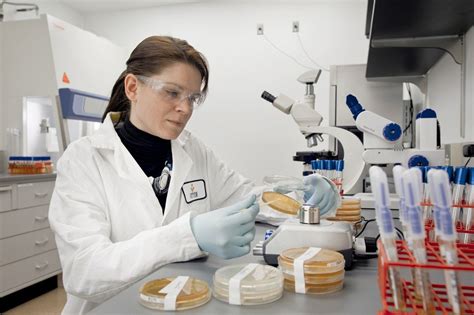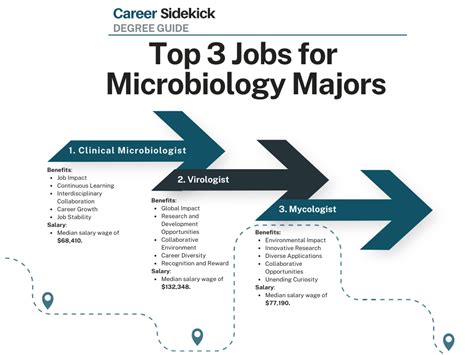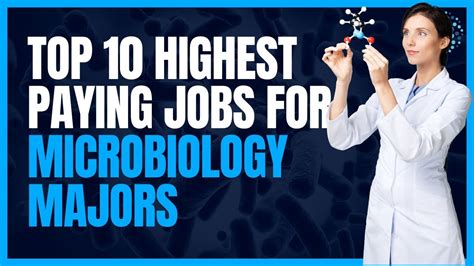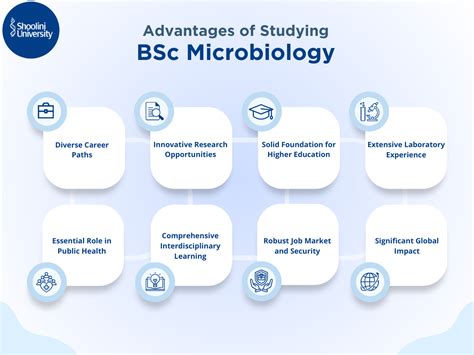Microbiology Careers

Microbiology is an exciting field of science that delves into the microscopic world of microorganisms, exploring their diverse roles, impacts, and applications across various sectors. Careers in microbiology offer a fascinating blend of scientific discovery, practical application, and innovation, making it an attractive field for those with a passion for the minute details of life.
The World of Microbiology: A Career Overview

Microbiology careers span a wide spectrum, from basic research and laboratory work to applied fields like medicine, agriculture, environmental science, and biotechnology. These professionals study the behavior, growth, and characteristics of microscopic organisms, including bacteria, viruses, fungi, algae, and parasites, to unravel their mysteries and harness their potential for the betterment of society.
With the ever-increasing awareness of the role of microorganisms in health, disease, and the environment, the demand for microbiologists is growing steadily. Their expertise is vital in tackling global challenges, from the development of new drugs and vaccines to addressing environmental issues and ensuring food safety.
Research and Academic Roles
At the core of microbiology lies research, where microbiologists explore the fundamental aspects of microbial life. This includes understanding the molecular mechanisms of microbial growth, evolution, and interactions with other organisms and the environment. Research microbiologists often work in universities, research institutes, or government agencies, contributing to the advancement of scientific knowledge and often publishing their findings in peer-reviewed journals.
The academic world also offers opportunities for teaching and mentoring the next generation of microbiologists. These roles involve designing and delivering courses, supervising student projects, and guiding research endeavors, all while contributing to the intellectual growth of the field.
| Research Institution | Focus Area |
|---|---|
| Centers for Disease Control and Prevention (CDC) | Epidemiology, Infectious Diseases |
| National Institutes of Health (NIH) | Microbial Pathogenesis, Immunology |
| Massachusetts Institute of Technology (MIT) | Microbial Ecology, Synthetic Biology |

Healthcare and Medical Fields
Microbiologists play a crucial role in the healthcare sector, where their expertise is vital in diagnosing and treating infectious diseases. They work in clinical laboratories, identifying pathogens and determining their antibiotic susceptibility, which guides medical treatment. Microbiologists also contribute to the development of new diagnostic tests, vaccines, and antimicrobial drugs, making a direct impact on public health.
In the medical field, microbiology careers can lead to roles as clinical microbiologists, infectious disease specialists, or epidemiologists. These professionals often collaborate with physicians, nurses, and other healthcare providers to ensure the best patient care.
| Healthcare Setting | Microbiology Role |
|---|---|
| Hospital | Clinical Microbiologist |
| Public Health Department | Infectious Disease Epidemiologist |
| Research Center | Vaccine Development Scientist |
Environmental Microbiology
Environmental microbiologists study the roles and impacts of microorganisms in the environment, including their involvement in biogeochemical cycles, bioremediation, and the maintenance of ecosystem health. They explore how microorganisms interact with their habitats and how these interactions can be harnessed for environmental benefit, such as in the cleanup of pollution or the production of biofuels.
Careers in this field can involve working for environmental consulting firms, government agencies, or research institutions, where microbiologists may contribute to environmental policy, assess the impact of human activities on ecosystems, or develop sustainable technologies.
Food and Agriculture
Microorganisms are integral to food production and preservation, and to maintaining the health and productivity of agricultural systems. Microbiologists in this field study the beneficial and harmful effects of microbes on food and crops, develop strategies for food safety and preservation, and explore the potential of microorganisms for improving agricultural productivity.
Careers in food and agriculture microbiology can range from working in food processing plants to research institutions, focusing on areas like foodborne illness prevention, fermentation processes, or the development of sustainable agricultural practices.
Biotechnology and Industry
The biotechnology sector offers a wide range of career opportunities for microbiologists, who contribute to the development of new products and processes using living organisms or their derivatives. Microbiologists in this field may work on the production of pharmaceuticals, enzymes, or biofuels, or be involved in the development of new technologies for the biotechnology industry.
Industrial microbiology careers can involve working for pharmaceutical companies, biofuel producers, or chemical manufacturers, where microbiologists apply their knowledge to improve production processes, develop new products, or ensure the quality and safety of biotechnological products.
Skills and Qualifications for a Career in Microbiology

A successful career in microbiology requires a strong foundation in the biological sciences, with a focus on microbiology, biochemistry, genetics, and cell biology. Many microbiology careers also require specialized knowledge in areas like immunology, virology, or microbial ecology.
In addition to scientific expertise, microbiologists need strong analytical skills to interpret complex data, excellent communication skills to convey their findings, and often a creative mindset to develop innovative solutions to real-world problems. A high level of attention to detail is also essential, as microbiologists frequently work with precise and delicate techniques and equipment.
Education and Training
A bachelor’s degree in microbiology, biology, or a related field is often the minimum requirement for entry-level positions. However, many microbiology careers, especially those in research and specialized fields, require advanced degrees such as a master’s or Ph.D. These advanced degrees provide deeper specialization and often involve original research, preparing graduates for leadership roles in their field.
Practical training and experience in a laboratory setting are also highly valued. Many universities and research institutions offer opportunities for undergraduate and graduate students to gain hands-on experience through research projects, internships, or work-study programs.
Professional Development and Certifications
Continuing education and professional development are essential for microbiologists to stay current with the latest advancements in their field. This can include attending conferences, workshops, and seminars, as well as pursuing professional certifications.
While certifications are not always required, they can enhance a microbiologist's credentials and demonstrate their expertise in a particular area. For example, the American Society for Microbiology offers several certifications, such as the Certified Clinical Microbiologist (CCM) and the Certified Professional in Food Safety (CP-FS), which can be beneficial for those working in clinical laboratories or the food industry, respectively.
The Future of Microbiology Careers
The field of microbiology is dynamic and constantly evolving, with new discoveries and applications emerging regularly. The increasing importance of microorganisms in various sectors, from healthcare to environmental sustainability, ensures that microbiology careers will remain in high demand.
Advancements in technology, such as next-generation sequencing and synthetic biology, are opening up new avenues for microbiological research and application. These technologies are allowing microbiologists to delve deeper into the microbial world, uncovering new insights and opportunities for innovation.
The interdisciplinary nature of microbiology also presents exciting career prospects. Microbiologists often collaborate with professionals from diverse fields, including chemistry, engineering, computer science, and data analytics, to tackle complex challenges. This cross-disciplinary approach broadens the career paths available to microbiologists and offers opportunities to make significant contributions to multiple fields.
Emerging Areas of Focus
Several emerging areas within microbiology are expected to drive career opportunities in the coming years. These include:
- Microbiome Research: The study of the microbiome, the collection of microorganisms in a particular environment, is a rapidly growing field. Microbiologists are exploring the role of the human microbiome in health and disease, as well as the microbiomes of other organisms and ecosystems. This field has implications for personalized medicine, environmental health, and agricultural productivity.
- Microbial Biotechnology: This field involves the use of microorganisms for the development of new products and processes. Microbiologists are working on the production of sustainable biofuels, enzymes for industrial processes, and even the creation of new materials, opening up a wide range of career opportunities in industry and academia.
- Antimicrobial Resistance: With the growing threat of antimicrobial resistance, microbiologists play a critical role in understanding and combating this global health challenge. Careers in this field involve research, development of new antimicrobial agents, and policy work to promote the appropriate use of antibiotics and other antimicrobials.
Conclusion
A career in microbiology offers a unique and rewarding path for those intrigued by the microscopic world and its vast implications. With a diverse range of career options, from research and academia to healthcare, environmental science, and industry, microbiology provides an exciting and impactful field for scientific exploration and practical application.
As the field continues to evolve and expand, microbiologists will remain at the forefront of scientific discovery, addressing global challenges and shaping the future with their expertise and innovations. The opportunities in microbiology are limitless, offering a fulfilling and ever-changing career journey.
Additional Resources
- American Society for Microbiology
- Centers for Disease Control and Prevention Careers
- National Institutes of Health Careers
- Microbiology Society
What are the entry-level requirements for a career in microbiology?
+
Typically, a bachelor’s degree in microbiology, biology, or a related field is the minimum requirement. This provides a solid foundation in the biological sciences and often includes core courses in microbiology, biochemistry, genetics, and cell biology. Practical experience in a laboratory setting is also highly valued, and many universities offer opportunities for undergraduate research or internships.
What are the career prospects for microbiologists in the healthcare sector?
+
Microbiologists play a crucial role in the healthcare sector, particularly in clinical laboratories, infectious disease research, and public health. They are involved in the diagnosis and treatment of infectious diseases, the development of new vaccines and drugs, and the management of antimicrobial resistance. Career prospects in this field are excellent, with a growing demand for skilled microbiologists to address these critical health challenges.
How do microbiologists contribute to environmental sustainability?
+
Environmental microbiologists study the roles and impacts of microorganisms in ecosystems, including their involvement in biogeochemical cycles, bioremediation, and the maintenance of ecosystem health. They explore how microorganisms can be harnessed for environmental benefit, such as in the cleanup of pollution or the production of sustainable biofuels. Microbiologists’ contributions are vital for developing strategies to address environmental challenges and promote sustainability.



